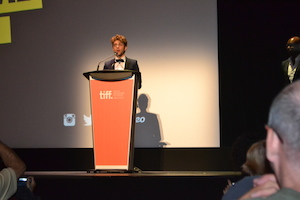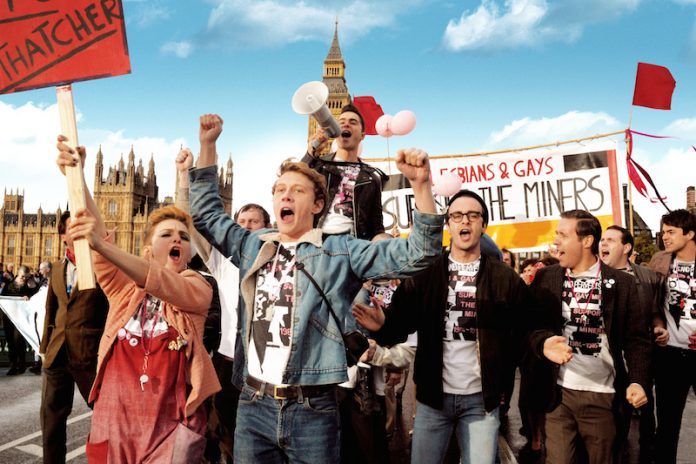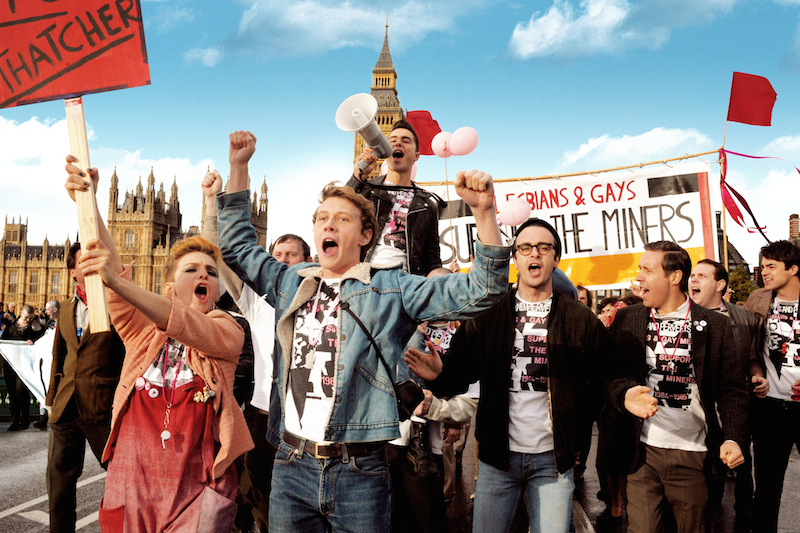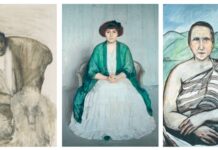The 14th annual Toronto International Film Festival I(TIFF) drew major stars, press, paparazzi and audiences to their cosmopolitan Canadian city for the first two weeks of September. TIFF has become the premiere showcase for high-profile releases that are likely awards contenders. Last year, “12 Years a Slave” and “Dallas Buyers Club” created immediate buzz. Although there was no clear frontrunner this year, TIFF had one of the strongest lineup of gay-themed films in recent memory, including the terrific crowd pleaser “Pride” and the prestigious historical drama “The Imitation Game,” which is likely to land a best picture nomination.
“The Imitation Game,” which won the Grolsch People’s Choice Award at the close of the fest, stars Benedict Cumberbatch as mathematician and pioneering computer scientist Alan Turing, a gay man when homosexuality was still illegal in England. Turing worked for British intelligence during World War II and broke of the “unbreakable” German Enigma code, a feat that led directly to an Allied victory. But Turing and his Bletchley Park cohorts could not celebrate — their vital intelligence work was kept secret for decades for security reasons. But secrecy was part of Turing’s life since boyhood: he had to deny the love of his life, fellow student and puzzle-solver Christopher Morcom, depicted in the film by tender flashbacks.
Director Morten Tyldum’s polished, unapologetically old-fashioned film (set for release in November) is aided by masterful performances by Cumberbatch and Keira Knightley as Turing’s colleague Joan Clarke, a brilliant mathematician at a time when women were relegated to clerical jobs. Like Turing, she’s a social outcast who cares little for convention. She knows Turing is gay and is willing to marry him anyway, but that doesn’t happen. In 1952, as post-war England struggled, Turing was arrested and convicted for “gross indecency” (he’d hired a rent boy), opted for chemical castration rather than imprisonment, and died a year later, most likely a suicide. He was pardoned by the Queen in 2009, a nice enough gesture that did nothing to right the wrong of thousands of others similarly persecuted until homosexuality was legalized in England in 1967.
Fast forward 17 years and you have the era of “Pride,” based on real events that took place in Thatcher’s England, when a rag-tag band of London-based LGBT activists decided to help mine workers during a brutal strike in 1984. This famous alliance is so fascinating and inspiring that it’s hard to believe it hasn’t been turned into a movie until now. Director Matthew Warchus, a famed British theater director who was just named Kevin Spacey’s replacement as artistic director of London’s Old Vic, brings a gritty look and feel to “Pride” that recalls the films of Ken Loach, chronicler of the British working class. It’s closer to Loach and gay director Terence Davies (“The Long Day Closes”) than to, say, “The Full Monty.”
“Pride,” which opens Oct. 10 in Boston, begins at the June 1984 London Gay Pride march as suburban, closeted, 20-year-old Joe (George MacKay) nervously joins what is a boisterous political march, not a mardi gras. He befriends a group that hangs out at Gay’s the Word bookstore. Led by the charismatic Northern Irishman Mark (a winning performance from New York-born, London-trained actor Ben Schnetzer) and Northern English activist Mike (Joseph Gilgun), this likable bunch — bookstore owner Gethin (Andrew Scott) who’s been disowned by his family; his boyfriend, flamboyant actor Jonathan (Dominic West) who later wins over some middle-aged women by dancing to “Shame, Shame, Shame”; and the feisty, smart token lesbian Steph (Faye Marsay) — christens itself Gays for Striking Miners (LGSM) and goes about grassroots fund-rising.The miners are led by Paddy Considine as a pragmatic union man, Imelda Staunton as a no-nonsense organizer, and Bill Nighy as a former miner who finds himself through the LGSM. The workers are initially mistrusting of the LGSM, but grow to respect their dedication, coming to see them less as “others” and more as kindred spirits. The film’s mix of humor and drama as we witness the dawning of the AIDS epidemic makes it a bittersweet portrait of the ‘80s. But its clear-eyed view of political alliances forged by two underclasses, and the power that comes with uniting over common interests, makes it relevant today.
Gay filmmakers Francois Ozon of France and Xavier Dolan of Canada both took new films to Toronto. The prolific Ozon, known for, among other films, “Swimming Pool,” “In the House” and last year’s “Young and Beautiful,” delivers one of his lighter works with “The New Girlfriend,” a kind of Gallic “Tootsie” but still with Ozon’s trademark psycho/sexual and identity blurring. Anaïs Demoustier plays Claire, a young woman who is devastated by the sudden death of her lifelong best friend, who leaves behind her husband David (handsome Romain Duris) and an infant. When Claire unexpectedly visits, she’s shocked to find a strange woman feeding the baby. It’s David in drag as “Virginia.” Horrified, confused and a little titillated, Claire and Virginia begin a tentative but gradually deepening friendship and, most surprising and satisfying, an unconventional romance. Ozon loosely adapted a short story by Ruth Rendell, gives it a few flourishes of Pedro Almodovar, and delivers a film that examines how fluid rigid notions of gender, sexuality and “perversity” really are.
Dolan’s Mommy, winner of the Jury Prize at Cannes, earned a standing ovation from the sell-out crowd I saw it with at TIFF, with the 25 year old filmmaker in attendance. Although Dolan’s probed mother-son dynamics with his first film, “I Killed My Mother,” this time the powerful story comes largely from the mother’s point of view and Anne Dorval as working class, well-meaning, single mom Diane “Die” Després is simply stunning — in a just world, she’d take home all best actress honors this year. As the out-of-control 15-year old son she tries to manage, Antoine Olivier Pilon is angel and devil. A scene of him being bullied and called “faggot” was reportedly taken from Ozon’s own life and it is a devastating moment that resonates through the ensuing action. Raw, stylish and provocative, Mommy was my favorite film at this year’s TIFF and signals Dolan’s arrival on the world cinema stage.

Another film that made a splash was director David Thorpe’s debut feature “Do I Sound Gay?” It will open DOC NYC, the largest US documentary film festival, on November 13. Thorpe, a Brooklyn journalist, candidly documents his quest to understand his discomfort with his “gay voice” and enlists commentators such as Margaret Cho, Tim Gunn, Dan Savage, David Sedaris and George Takei, among others. Funny, personal and informative, “Do I Sound Gay?” explores the link between sexuality and speech, and cultural expectations and baggage (clips from TV and movies with “sissy” characters, often villians, are telling and heartbreaking). In a bit of taboo-breaking Thorpe talks about his voice with family and gay friends, as he examines his pride in a subculture and a desire to not be identified as gay as soon as he opens his mouth. He enlists a vocal coach, and ends up finding many people both gay and straight who are uncomfortable with their voices. What starts out as a personal quest becomes something universal — a journey of self-discovery and acceptance.










